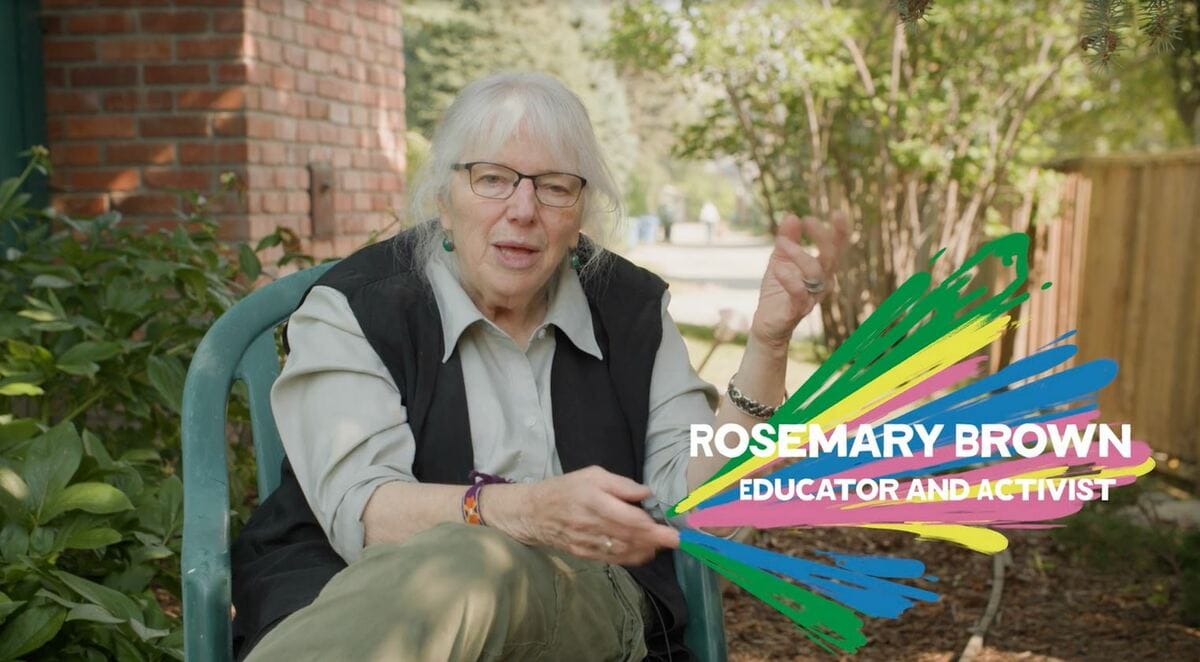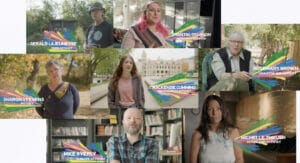
A new documentary about seven Calgary activists will take audiences through 50 years of change in just 20 minutes.
Sh*t We Believed was made by Calgary director Chris Hsiung, who was inspired by the idea of how controversial topics have spurred change within communities.
Those involved with the Arusha Centre, an organization that provides resources and education to promote social and environmental activism, say they wanted to celebrate its 50th anniversary by honouring all of the activists who have come and gone through its doors.
“We wanted to document and celebrate being around that long,” says the film’s producer Gerald Wheatley, who is also the manager at the Arusha Centre.
A long list of activists to choose from
Over the past 50 years, many local activists have pioneered change in areas including environmental issues, LGBTQ rights, and education.
“We wanted to share stories that Calgarians were not likely to know about, some of the things that have helped shape the city,” Wheatley says.
Despite the large pool of activists to choose from, the 20-minute film only allowed for seven to be featured, but the creators made the most of the time allotted.
Hsiung conducted a series of interviews to illustrate the impact these inspirational people have made on their communities.
“I was particularly interested in what it was that kept them going, the responsibility that they took, and the call to action for the main population,” Hsiung says, adding the film features photos and videos from the activists’ previous work.
The other activists are; Indigenous actor Michelle Thrush, “artivist” Sharon Stevens, climate leadership capacity builder Mike Byerley, Indigenous educator Chantal Chagnon, youth climate organizer Mackenzie Cumming, and educator and local food advocate Gerald Lajeunesse.

Resistance to change is human nature
People are often resistant to change, Hsuing says, pointing to the public smoking ban and the mandatory use of seat belts as examples.
He hopes the film makes people realize that these once unpopular changes eventually became much more acceptable.
“Most new ideas that have something to do with changing how we live face resistance. But as momentum builds, more and more people come around to it and see the change happening,” Hsiung says.
Hsiung hopes audiences who watch the film can see the broad scope of change over time.
Highlighting a local anti-racism activist
One of the seven people showcased in the film is anti-racism activist Rosemary Brown.
“Rosemary Brown is a longtime activist and she grew up in a time when women were seen in such a demeaning way. And yet, she made her voice known,” Hsiung says.
Growing up with a trade unionist father who stood up in defense of workers, and with a mother who grew up in poverty, Brown was inspired to become an activist from a young age.
“I’ve always been aware of economic inequities in our society and the disparity that exists,” Brown says.
“You can’t have that awareness without looking at who’s been most disproportionately impacted, for example, by poverty and it will be Indigenous peoples, racialized peoples, and immigrants.”
A life full of activism
Brown’s path began in Toronto in the ‘70s where she met the late civil rights activist Charles Roach, who created the Committee Against Racism.
“That was a group I was drawn to. The work at that time focused on the deportation of visa workers,” Brown explains.
“There were rallies around the immigration system, police shootings, shootings of Black youth. Unfortunately, these issues are still with us today.”
In the late ‘70s, Brown moved to Calgary and helped create a local Committee Against Racism, with the help of several others.
Almost immediately, she recognized how prevalent anti-Indigenous racism was in Alberta in comparison to Toronto.
“I’m not saying that those issues did not exist in Toronto, but I was not as aware of them,” Brown says.
Flagging local issues
As soon as the Calgary committee began, Brown recalls hearing issues regarding Indigenous communities, including police brutality and land claims.
The Committee Against Racism has been involved in issues locally and around the world and works in educating people to challenge their views and personal biases.
In the ‘90s, the Women of Colour Collective (WOCC) was created in order to propel the voices of people of colour.
“The challenge was in many ways for us to examine ourselves, our own attitudes, beliefs, and assumptions. We’re not separate from these institutions that exist in our society,” Brown says.
“It challenged those of us who are white to move over and create space to work, but not always be in the lead around this work.”
‘How do we all keep going?’
The WOCC organized an event at which famous American author Bell Hooks spoke.
Brown asked Hooks one important question: “How do we all keep going?”
“And Bell Hooks just said, ‘Only the privileged can afford to be cynical,’” Brown says.
This statement further fuelled her motivation, and Brown continues to work against racism and help marginalized communities even at 77 years old.
“If you’re a social justice or environmental activist, it’s not something you retire from,” Brown says.
“Once you’re aware of what’s going on in the world, and especially if you have any privilege, whether it’s white privilege or class privilege, it’s then your responsibility to use that privilege to challenge these things.”
A humble honour
Brown, who worked at the Arusha Centre from 1990 to 2000 as a global education and anti-racism education coordinator, was honoured to be chosen to participate in the documentary.
“I feel humbled because there are other people who were also connected to Arusha and have been incredible activists in their lives,” she adds.
After a year in the making, Brown is excited to see the final result of the film and meet the other activists represented at its premiere on Feb. 1 at the cSpace at King Edward.
“I hope people take away a sense of hope and understand that we all have a role to play and that we all benefit from a more equitable world.”
Tickets to the premiere are sold out, but stay tuned for more details here.

